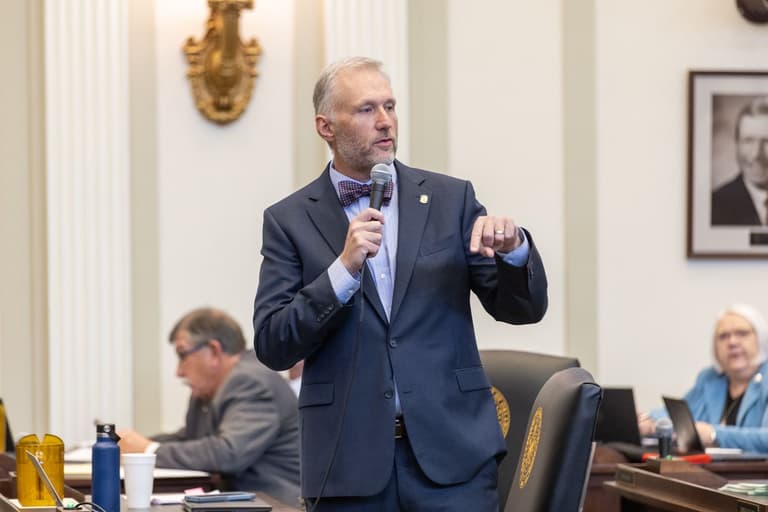
Education
Oklahoma lawmakers vote to end discrimination against special-needs children
Ray Carter | April 16, 2025
Members of a state House committee have voted to end a two-tiered system that forces the families of children with special needs to jump through hoops that other families are not subjected to when accessing a school-choice program.
“We have two very different forms of school choice available for us today,” said state Rep. Chad Caldwell, R-Enid. “If you are a family with a student—with a traditional student—you can access those funds from day one. If you are a family with a special-needs student, you can’t. We make you wait a year. We make you jump through a hoop that we don’t ask our traditional students to do. We are discriminating as a state against our special-needs students.”
Since 2010, Oklahoma’s Lindsey Nicole Henry Scholarships for Students with Disabilities (LNH) program has allowed students to use state tax dollars to pay for private-school tuition. Those eligible for the program are primarily children with special needs, such as autism.
The scholarships range from $4,196 to $22,236 per child, based on a child’s diagnosis.
However, children cannot currently receive an LNH scholarship until they have been in the public-school system for at least one year, even when a local school cannot properly serve a child and parents have identified a private school that can.
“As a parent with a child with an IEP, there are a lot of public schools that do a phenomenal program, and then there are a few that do not.” —State Rep. Dell Kerbs (R-Shawnee)
That’s in sharp contrast to the Oklahoma Parental Choice Tax Credit program, which provides refundable tax credits of $5,000 to $7,500 per child to cover the cost of private school tuition, with the largest credits going to those with the lowest income. Families can immediately access those funds without waiting a year.
Senate Bill 105, by state Sen. Julie Daniels and Caldwell, eliminates the one-year requirement for Oklahoma children to receive an LNH scholarship.
Caldwell said local school officials have explicitly told some parents that the school lacks the resources necessary to meet their child’s unique needs. But those families are forced to keep their child in that public school for at least a year, squandering precious learning opportunities for their child.
“They’re going to have to sacrifice a year for a school that the parent doesn’t want their kid to be in and (in) the school that said that they can’t meet the needs of their student, and they’re going to forfeit the opportunity to go to a school that would better meet the needs of their student,” Caldwell noted.
Opponents argued that private schools do not have to abide by the provisions of an individualized education program (IEP) prepared for a child with special needs. But Caldwell noted that public schools receive additional taxpayer funds for children with special needs on an IEP but the school “is not required to spend the funds” serving that specific child.
Another supporter of SB 105 noted the same general issue.
“As a parent with a child with an IEP, there are a lot of public schools that do a phenomenal program, and then there are a few that do not,” said state Rep. Dell Kerbs, R-Shawnee.
He urged lawmakers to empower parents, noting parents have far more insight into their own child’s needs than do other adults.
“We need to remember when we are talking in these (IEP) meetings that we are talking about students and families with special needs that live it 24/7/365,” Kerbs said.
State Rep. Chad Caldwell (R-Enid) noted that private schools have a much more significant form of accountability under the LNH program than what their public-school counterparts face.
The LNH program has helped children with special needs, as well as foster children and adoptive children, attend private school at a significantly lower average cost than what is spent per child in public schools in Oklahoma.
In the 2023-2024 school year, the most recent for which data are available, the LNH program provided $12.2 million in scholarships to 1,557 students for an average LNH scholarship of $7,866 per student.
That’s substantially less than the average per-pupil revenue provided for all public-school students.
According to financial data reported by schools to the state’s Oklahoma Cost Accounting System (OCAS), new revenue in Oklahoma public schools reached $9,600,703,488 in the 2023-2024 school year. Since student enrollment was 698,923 that year, that comes out to an average of $13,736 per pupil.
And, Caldwell noted, private schools have a much more significant form of accountability under the LNH program than what their public-school counterparts face.
“Unlike for our public schools, if a private school isn’t effectively meeting the needs of their student and the parent moves out of that school, 100 percent of the funding goes with that student,” Caldwell said. “That’s ultimate accountability.”
SB 105 previously passed out of the Oklahoma Senate on a 35-10 vote. It passed out of the House Education Oversight Committee on a 6-3 vote, marking the second time the bill has passed through a House committee. The legislation now proceeds to the floor of the Oklahoma House of Representatives.

Ray Carter
Director, Center for Independent Journalism
Ray Carter is the director of OCPA’s Center for Independent Journalism. He has two decades of experience in journalism and communications. He previously served as senior Capitol reporter for The Journal Record, media director for the Oklahoma House of Representatives, and chief editorial writer at The Oklahoman. As a reporter for The Journal Record, Carter received 12 Carl Rogan Awards in four years—including awards for investigative reporting, general news reporting, feature writing, spot news reporting, business reporting, and sports reporting. While at The Oklahoman, he was the recipient of several awards, including first place in the editorial writing category of the Associated Press/Oklahoma News Executives Carl Rogan Memorial News Excellence Competition for an editorial on the history of racism in the Oklahoma legislature.